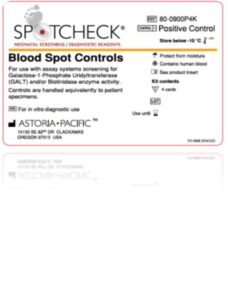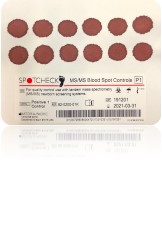REFERENCE MATERIALS
SPOTCHECK by Astoria-Pacific also offers a variety of Reference Materials, including those for Tandem MS/MS. Available Reference Materials.
POSITIVE BLOOD SPOT CONTROLS
BIOTINIDASE DEFICIENCY, GALACTOSEMIAS DEFICIENCY | BIOMARKERS: BIO, GALT
The Positive Blood Spot Controls are quality control material for use with assays detecting enzyme activity or analyte concentration in association with newborn screening for inborn errors of metabolism. They are intended for use as control material in the qualitative, semi-quantitative, or quantitative determination of the activity of the enzymes Galactose-1-phosphate Uridyltransferase (GALT) and Biotinidase (BIO) in human whole blood. The Blood Spot Controls are treated in the same manner as the patient samples in the course of analysis.
PRODUCT HIGHLIGHTS
- Flexibility for use by any laboratory – Use is independent of method, vendor, or platform
- Allows for supplementary confirmation of screening performance – Independent, third party controls
- Considerable quality control benefit in a small package – Individually labeled cards supply 12 dried blood spots each
NEGATIVE BLOOD SPOT CONTROLS
BIOTINIDASE DEFICIENCY, GALACTOSEMIAS DEFICIENCY | BIOMARKERS: BIO, GALT
The Negative Blood Spot Controls are quality control material for use with assays detecting enzyme activity or analyte concentration in association with newborn screening for inborn errors of metabolism. They are intended for use as control material in the qualitative, semi-quantitative or quantitative determination of the activity of the enzymes Galactose-1-phosphate Uridyltransferase (GALT) and Biotinidase (BIO) in human whole blood. The Blood Spot Controls are treated in the same manner as the patient samples in the course of analysis.
PRODUCT HIGHLIGHTS
- Flexibility for use by any laboratory – Use is independent of method, vendor, or platform
- Allows for supplementary confirmation of screening performance – Independent, third party controls
- Considerable quality control benefit in a small package – Individually labeled cards supply 12 dried blood spots each
TANDEM MS: MS/MS BLOOD SPOT CONTROLS
AMINO ACID, ORGANIC ACID, AND FATTY ACID OXIDATION DISORDERS |
BIOMARKERS: AMINO ACIDS, SUCCINYLACETONE, FREE CARNITINE, ACYLCARNITINES, CARNITINES
The SPOTCHECK® MS/MS Blood Spot Controls consist of quality control material intended for use with quantitative tandem mass spectrometry (MS/MS) systems screening for a comprehensive panel of neonatal genetic and metabolic disorders in dried human whole blood. Measurement profiles of specimen concentrations of amino acids, free carnitine, acylcarnitines, and succinylacetone (SUAC) are used in the diagnosis and treatment of organic acid, fatty acid oxidation, and amino acid disorders. The controls’ analyte profiles are designed to provide the user with a reference for quality control monitoring of system performance. The dried blood spot controls are treated in the same manner as the patient samples in the course of analysis.
PRODUCT HIGHLIGHTS
- Allows for supplementary confirmation of screening performance – Third party, independent controls
- Flexibility for use in any laboratory – Use is independent of screening method, vendor, or mass spectrometry system; effective for derivatized or non-derivatized test methods
- Represents metabolic disease states for multiple analytes on the same card – Optimized metabolic profiles consistent with a true positive algorithm
- Monitoring biomarker ratios provides additional opportunity for quality control – Provides insight into system performance
Please contact Astoria-Pacific for more information.


